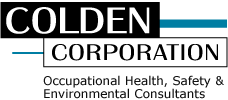The Boston regional office for Colden recently received approval from the Commonwealth of Massachusetts Department of Fire Services (DFS) to provide state-mandated Hot Works training seminars. The session has been designed to meet the minimum requirements of 527 CMR 1.0 Chapter 41, Welding, Cutting, and other Hot Work, Section 41.7 and include applicable information from:
- The Massachusetts Comprehensive Fire Safety Code, 527 CMR 1.00 Chapter 41
- 29 CFR Subpart Q 1910.252 – Welding, Cutting, and Brazing along with other related OSHA standards
- NFPA 51B Standard for Fire Prevention During Welding, Cutting, and Other Hot Work
- NFPA 241 Standard for Safeguarding Construction, Alteration, Demolition Operations
- ANSI Z49 Safety in Welding and Allied Processes
Colden’s highly experienced, certified, and qualified consulting staff looks forward to providing this training to its clients in the Commonwealth and those who are not based in Massachusetts, but who have facilities and operations that must comply with the standard. As a bonus, and unlike other programs in Massachusetts, Colden also includes a general overview of other safety and industrial hygiene-related hazards, risks, and control measures related to hot work that employers may not be aware of. The in-person only training seminar can be provided anywhere in the State and can be presented by itself or can be packaged with other OSHA-mandated training such as Emergency Action Plans (1910.38), Fire Prevention Plans (1910.39), initial/annual portable fire extinguisher training, among others.
Colden also has a 2-hour session on “General Welding Hazards and Risks” that includes the DFS information along with other applicable OSHA and workplace safety information.
Lastly, Colden can provide a 2-day training class “Evaluating and Monitoring Airborne Contaminants in the Welding Environment” that includes the information noted above, a comprehensive review of welding hazards and risks, and how to qualitatively and quantitatively evaluate welding hazards and risks. The classroom session is supplemented with hands-on laboratory sessions that teach attendees how to conduct fundamental air monitoring for welding work-related aerosols (e.g., dusts, mists, fumes, etc.), vapors, and gases.
To learn more information about Colden’s additional Health and Safety training programs, click here.

